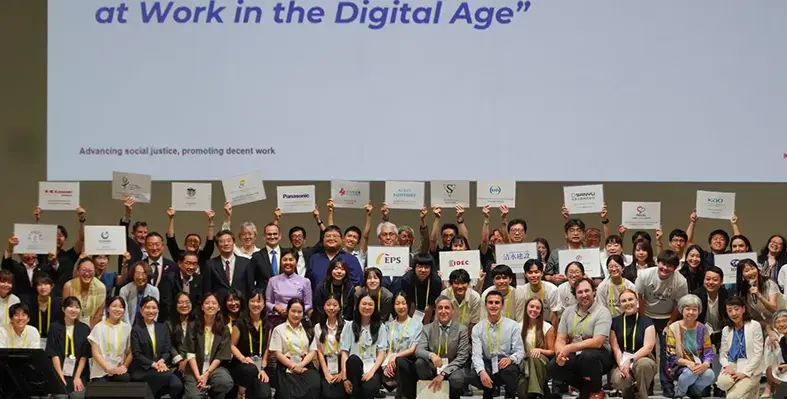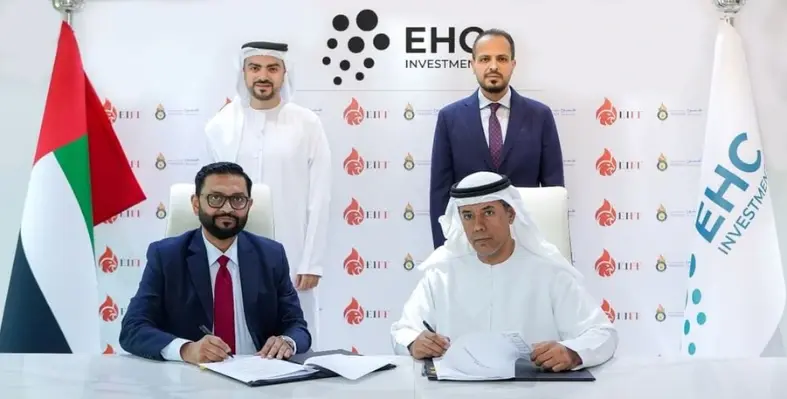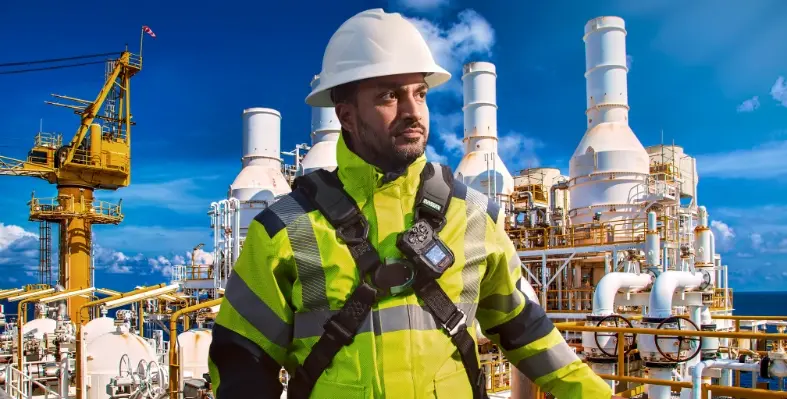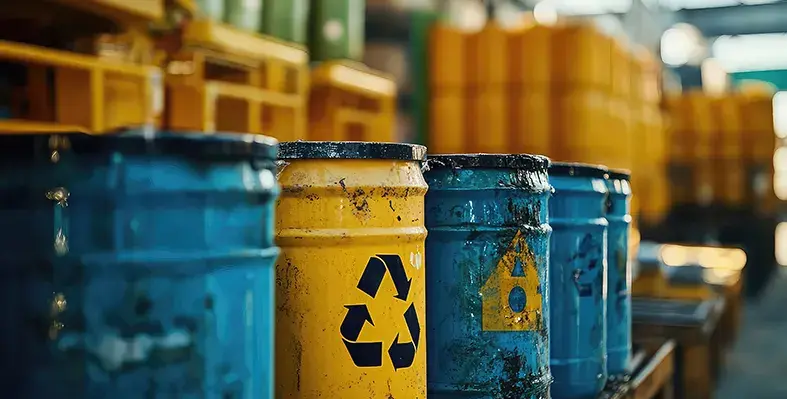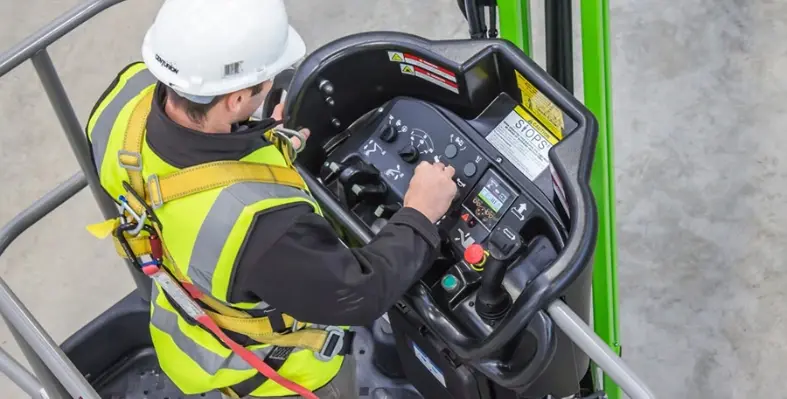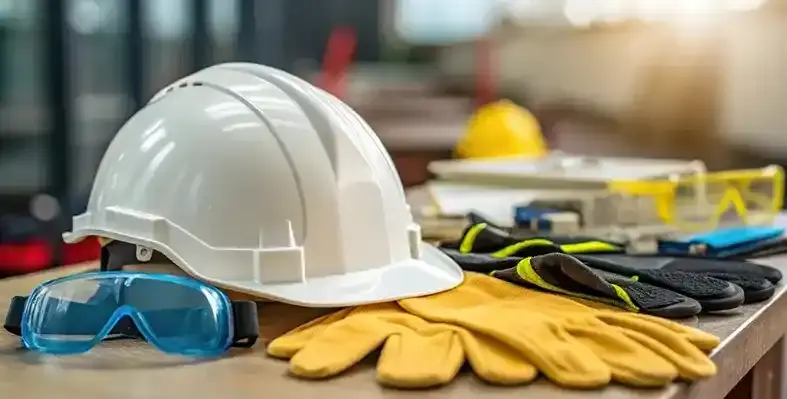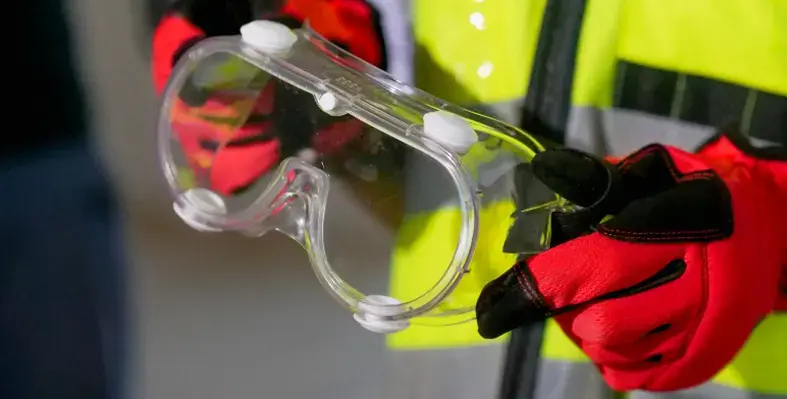Industrial Insights
Industrial Insights
- Details
- Sania Aziz
- Industrial Insights
- Date: 28 July 2025
- Year: 2025
In a groundbreaking initiative, the International Labour Organization (ILO) brought together youth voices to champion occupational safety and health (OSH) at EXPO 2025 in Osaka, Kansai, Japan.
The inaugural "Youth Congress" pitch contest, held on 17 July 2025, featured eight student teams from across the globe presenting innovative ideas to improve workplace safety. Among the special guests were Japanese celebrities Yoko Oginome and Aki Mukai, who joined to support the cause.
Mahidol University of Thailand took home the top prize for its app designed to safeguard the rights and safety of delivery drivers. Brigham Young University (USA) and the University of Occupational and Environmental Health Japan were also recognised for their creative contributions to OSH.
The winning concepts are set to be implemented by companies, underscoring the real-world impact of youth-driven ideas. The pitch contest concluded a three-year journey involving more than 200 students from 25 institutions across eight countries. Beginning in 2024, participants attended seminars and mentoring sessions on workplace safety, culminating in the selection of eight finalists whose Calls to Action were presented in Osaka.
The Youth Congress was a key feature of the EXPO 2025 Days on Safety, Health & Well-being for All, hosted under the Global Initiative for Safety, Health and Well-being (GISHW). Inspired by the ILO’s 2022 resolution recognising a safe and healthy working environment as a Fundamental Principle and Right at Work, the event called on young people, who often face heightened OSH risks, to shape safer, more inclusive workplaces in the digital age.
Mahidol University team members Nahataichanok Pathomrojsakul and Sunita Songjaroen expressed the motivation behind their proposal stating, "We chose this theme because delivery drivers face high risks to accidents and health problems under the overwhelming pressure from customer reviews. They often lack insurance and protective measures."
"The creativity of proposals and level of commitment by all the young people taking part has been outstanding," said Yuka Ujita, ILO senior specialist for occupational safety and health. "Their ideas bring fresh perspectives and innovative solutions to today’s workplace challenges, especially in the context of digital transformation, climate change and the demographic transition. These young voices have to much to offer and must be heard."
- Details
- Sania Aziz
- Industrial Insights
- Date: 25 July 2025
- Year: 2025
Honeywell has acquired the Li-ion Tamer business from Nexceris, strengthening its fire and life safety portfolio with a proven off-gas detection technology that identifies early signs of thermal runaway in lithium-ion batteries.
The acquisition, built on a five-year partnership with Nexceris, enhances Honeywell’s Building Automation segment and is expected to be immediately accretive.
As global demand for lithium-ion batteries surges, projected to exceed US$400bn by 2030, safety solutions like Li-ion Tamer are increasingly vital.
The technology detects off-gassing up to 30 minutes before thermal runaway, giving operators time to prevent fires and limit system damage. It is already trusted by major battery OEMs worldwide.
The acquisition brings more than 30 global patents into Honeywell’s ecosystem and will integrate with the company’s existing safety offerings, including VESDA early smoke detection and Connected Life Safety Services on the Honeywell Forge IoT platform.
This move complements Honeywell’s broader strategy of focused growth, portfolio simplification, and recent acquisitions totalling US$13.5bn.
"As lithium-ion battery use grows rapidly across data centers, EV infrastructure, and grid-scale energy storage, the risk of fire is increasing in parallel," said Billal Hammoud, president and CEO of Honeywell's Building Automation segment.
"Li-ion Tamer's early warning technology has been revolutionary for our customers and partners over the last five years. Building on our legacy partnership, the acquisition of this product suite will position Honeywell as a leader in early gas detection and battery fire prevention. We expect this tuck-in acquisition to further bolster growth of our fire detection business."
- Details
- Sania Aziz
- Industrial Insights
- Date: 24 July 2025
- Year: 2025
EHC Investment, through its safety-focused subsidiary Emirates International Firefighting (EIFF), has acquired 100% of Tamouh Fire and Safety (Tamouh), a leading fire protection solutions provider based in Abu Dhabi.
The acquisition reinforces EHC’s commitment to enhancing the UAE’s safety infrastructure and expanding its footprint in the fire and life-safety sector. It also supports the company’s long-term vision to integrate essential services under one umbrella, combining gas distribution, smart technologies, and fire protection systems.
Tamouh brings a robust track record in designing, installing and maintaining fire protection systems, along with emergency response services. Its adherence to international safety standards and use of advanced technologies have earned it the trust of residential, commercial and government clients across Abu Dhabi.
The deal complements EHC’s existing services, which already cater to more than 100,000 clients, particularly in the gas distribution space. With Tamouh now part of its portfolio, EHC aims to offer fully integrated safety and infrastructure solutions for both residential and industrial customers.
This move aligns with EHC’s broader strategy to invest in critical service providers that strengthen national resilience, support economic diversification, and contribute to the UAE’s long-term development goals. The acquisition will also enable both entities to scale their offerings across the region, while positioning the UAE as a leader in fire safety infrastructure.
Ali Al Gebely, managing director of EHC, commented, “Our acquisition of Tamouh demonstrates EHC’s unwavering commitment to the UAE’s development agenda. We aim to support the nation’s rapid growth by elevating industry benchmarks, modernizing safety infrastructure, and delivering dependable fire protection services tailored to community needs.”
- Details
- Sania Aziz
- Industrial Insights
- Date: 23 July 2025
- Year: 2025
Workplaces across Bahrain are now legally required to implement enhanced medical aid and emergency treatment protocols following the introduction of a new ministerial resolution, according to a report by Gulf Daily News.
Issued by Health Minister Dr Jalila Al Sayyed and published in the latest edition of the Official Gazette, Resolution 3822 came into force in July.
The legislation sets out comprehensive regulations to improve occupational safety standards, focusing on medical preparedness, the availability of first-aid supplies, and a structured approach to responding to health emergencies, particularly in high-risk industries.
The resolution aligns with wider national efforts to strengthen preventative and life-saving measures, including a recent directive by the General Sports Authority requiring the installation of automated external defibrillators (AEDs) in gyms and fitness centres.
Under the new regulations, employers must ensure that first-aid arrangements are in place at every workplace.
This includes the provision of first-aid kits at a minimum ratio of one kit per 100 employees or fewer, and the designation of at least one trained and certified first-aider for every 20 workers. A member of staff must also be assigned to monitor kit availability and ensure compliance with reporting requirements.
Workplaces are now classified according to risk level, with Class A kits intended for low- to medium-risk environments such as offices or retail spaces, and Class B kits designated for high-risk sectors such as factories and construction sites.
Each classification requires a tailored set of medical supplies, with Class B kits demanding more comprehensive contents, including additional trauma pads, splints, tourniquets and cold packs.
AEDs remain optional for Class A environments, but their use is strongly encouraged in Class B settings.
The resolution requires employers to maintain detailed emergency plans that include evacuation routes, the locations of first-aid kits and contact information for nearby health facilities.
Immediate medical assistance must be summoned in the event of an injury, and employers are obligated to ensure the injured are transported to medical care without delay. All first-aid kits must be inspected regularly and records maintained accordingly.
Legal backing for this resolution draws from a number of key Bahraini statutes, including the 1976 Social Insurance Law, the 2012 Private Sector Employment Law, the 2018 Public Health Law and its executive bylaws, as well as the 2013 Occupational Safety Regulations.
Employers found in violation may face penalties under Article 192 of the 2012 law or Article 129 of the Public Health Law, depending on the nature of the infraction.
The new resolution officially repeals a 1976 decision concerning first-aid kits, replacing it with updated standards aligned with modern occupational health and emergency care practices.
- Details
- Sania Aziz
- Industrial Insights
- Date: 21 July 2025
- Year: 2025
Wolters Kluwer, a global leader in professional information, software solutions, and services, has announced a new global collaboration with Enterprise Health, one of the world’s largest providers of occupational health software, serving clients in over 50 countries.
The partnership brings advanced, clinical-grade occupational health capabilities to enterprises with on-site clinics and complex health needs.
Through this collaboration, Wolters Kluwer’s EHS & ESG platform will now offer enhanced occupational health features powered by Enterprise Health’s cloud-based, ONC-ACB-certified Electronic Health Record (EHR) system.
This system supports a full spectrum of occupational and employee health needs, from compliance, health surveillance, and injury management to chronic disease and wellness programmes.
Enterprise Health’s solution is highly configurable and interoperable, allowing enterprises to streamline clinical workflows and meet a variety of operational requirements across occupational medicine, leave management, and wellness initiatives, all within a single platform.
This partnership extends the depth and flexibility of Wolters Kluwer’s award-winning safety management system, which helps EHS professionals mitigate risk, ensure regulatory compliance, and embed safety into core processes.
Wolters Kluwer’s EHS & ESG business unit operates under its Corporate Performance & ESG (CP & ESG) division, a global leader in integrated software for EHS, ESG, audit, and performance management.
Through this alliance, both companies aim to equip enterprises with the tools needed to improve employee health outcomes and drive sustainable, risk-aware business strategies.
Richard Pulliam, SVP and general manager of Wolters Kluwer EHS & ESG, said, “We are committed to continuous innovation through product development and new collaborations to ensure our clients have access to transformative technologies enabling them to plan, predict and act in line with their health and safety commitments. We are delighted to collaborate with Enterprise Health, a global leader in employee health, to advance and enhance our occupational health offering.”
“We are laser focused on occupational and employee health, and collaborating with Wolters Kluwer in the EHS space results in a best-of-breed combination for enterprise-level clients,” said Enterprise Health president Jeff Donnell.
- Details
- Sania Aziz
- Industrial Insights
- Date: 18 July 2025
- Year: 2025
As a global leader in safety solutions, MSA Safety has been protecting workers for over a century.
In Saudi Arabia, MSA is supporting organisations across industries with world-class training programmes designed to strengthen workplace safety and compliance.
MSA recognises that safety equipment alone is not enough – proper training is critical to ensuring employees use equipment effectively and work safely in hazardous environments.
That’s why MSA offers certified, engaging training courses tailored to meet the needs of workers, supervisors, and trainers.
Delivered by experienced professionals, MSA’s training programmes in Saudi Arabia cover a wide range of safety-critical topics, including:
• Fall Protection Training – exceeding international standards for preventing falls from height.
• Confined Space Entry Inspection – guiding supervisors on managing confined space activities safely.
• Confined Space Training – in-depth technical instruction on confined space entry and rescue procedures.
• Spill Prevention Training – covering SPCC regulations and effective spill containment strategies.
• Gas Tester Training – equipping personnel to use, maintain, and calibrate MSA portable gas detectors.
• Respiratory Protection Training – ensuring correct use and maintenance of respirators for workplace compliance.
• HAZCOM Training – 24-hour HAZWOPER certification for hazard recognition and control.
• Lock-out/Tag-out (LOTO) – protecting workers during maintenance from hazardous energy releases.
• First Aid CPR – providing essential skills to respond to emergencies.
Each course is designed to meet international standards, combining theoretical and practical elements to ensure competency and confidence in the field.
With a commitment to helping Saudi organisations build safer workplaces, MSA makes it easy to access training locally.
To learn more or to register click here.
Because at MSA, we know that when workers are trained, lives are saved.
- Details
- Louise Waters
- Industrial Insights
- Topic: Industrial
- Region: Middle East
- Date: 16 July 2025
- Year: 2025
The Abu Dhabi Hazardous Materials Management Centre (ADHMMC) has launched the Abu Dhabi Hazardous Materials Management Centre Strategy for 2025–2027 with the aim of strengthening the hazardous materials management system in the emirate
This will involve implementing a comprehensive framework for regulating the supervision and oversight of all stages of hazardous materials handling, ensuring that all relevant entities comply with approved regulations through proactive, innovative solutions and advanced technologies, in collaboration with partners within an investment-friendly environment.
Key objectives include the integrated management of hazardous materials, empowerment and capacity building, strengthening institutional maturity and readiness, and the development of legislative and regulatory frameworks related to hazardous materials. These objectives aim to improve and develop laws and supporting policies that ensure effective governance and full compliance across all stages of hazardous materials handling.
His Excellency Ahmed Saif bin Zaytoon Al Muhairi, commander-in-chief of Abu Dhabi Police, said, "The launch of the centre’s strategy is a pivotal step in reinforcing the hazardous materials management system in the emirate. It reflects our leadership’s vision and commitment to building a safe, sustainable, and investment-attractive environment in the capital, further establishing Abu Dhabi as a global hub for sustainability and innovation."
His Excellency Khalfan Abdulla Khalfan Almansoori, acting director general of Abu Dhabi Hazardous Materials Management Centre added that the centre will adopt cutting-edge technologies and develop an integrated digital system, supported by monitoring systems for proactive smart tracking. It is also adopting advanced solutions and technologies that enhance preparedness and proactive risk management.
Through the launch of the strategy, Abu Dhabi Hazardous Materials Management Centre reaffirms its commitment to global best practices and enhancing community safety and environmental sustainability.
- Details
- Sania Aziz
- Industrial Insights
- Date: 16 July 2025
- Year: 2025
Niftylift has said that it continues to advance safety in powered access equipment by focusing on the practical risks of working at height.
Although industry statistics show improvement in workplace incident rates, the company remains committed to driving further innovation through smarter engineering and user-friendly technology.
One of its standout developments is the ToughCage platform, which combines a reinforced steel cage with a robust, impact-resistant composite base.
This dual-layer protection not only shields the operator in the event of a collision but also absorbs impact energy to minimise damage to the machine’s boom and surrounding structures.
To tackle the challenges of working on sloped ground, Niftylift has equipped its MEWPs with Inclination Sensing technology.
While machines can travel across gradients beyond operational limits when booms are stowed, any attempt to elevate the booms on a slope triggers alarms and disables the drive function.
The booms must be lowered and the machine repositioned before operations can resume, preventing unsafe working conditions on unstable terrain.
If the basket is raised and the tilt angle becomes too steep, the machine automatically halts drive functions until safely reset.
Operator safety also depends on proper use of personal fall protection equipment.
Built-in safeguards
Niftylift addresses this with its intuitive ClipOn system, which provides red and green LED indicators and an audible alert to confirm harnesses are correctly attached before work begins.
Trapping incidents remain one of the most severe risks when working at height, especially if an operator is forced against the control panel.
In response, Niftylift introduced SiOPS (Sustained Involuntary Operation Prevention System) across all self-propelled machines.
SiOPS detects pressure on the control console, immediately halting all machine movements without waiting for a user response, allowing the operator to recover by simply pressing a flashing green reset button.
Further reinforcing safety protocols is Load Sensing technology, which monitors platform weight in real time.
If the system detects an overload, it disables all work functions until the weight is reduced. During operation, a recovery override allows the basket to be safely lowered first.
Supporting these built-in safeguards is Niftylink, a telematics solution that provides performance insights, real-time diagnostics, and access control.
Using PIN codes or RFID-enabled PAL cards, Niftylink ensures that only trained and authorised personnel can operate the machines, reinforcing on-site compliance and reducing the risk of human error.
Recognising that many incidents result from knowledge gaps, Niftylift also launched the NiftyPRO mobile app, an on-demand training and support tool for operators, fleet managers, and technicians.
With over 100 video tutorials covering machine operation, troubleshooting, and recovery procedures, the app bridges the gap between theoretical training and real-world application, making best practices easily accessible on-site and in the moment.
By combining smart safety features, operator-focused design, and accessible digital training, Niftylift offers a comprehensive approach to making work at height safer, more efficient, and better supported.
“Niftylift is synonymous with innovations in operator safety, introducing technologies over the years that have redefined safety standards, addressing critical risks in working at height, including entrapment, overloading, harness misuse, and unsafe tilting,” said Tom Hadden, technical sales manager, Niftylift. ‘Together, they enhance operational efficiency and provide operators with the confidence they need to work safely at height. We are committed to continuing to lead the industry in promoting safer working practices worldwide.”
Also read: Niftylift's real-time harness safety compliance in access platforms
- Details
- Louise Waters
- PPE
- Topic: PPE
- Date: 11 July 2025
- Year: 2025
The British Safety Industry Federation (BSIF) has warned against the use of substandard PPE, and highlighted its wide availability in the UK market
The BSIF notes that that a recent recall of safety shoes sold via TikTok highlights this issue, where the recalled product claimed to offer protection despite failing to meet essential safety requirements. Similar footwear remains on sale on other platforms.
The shoes in question have now been recalled by the Office for Product Safety and Standards (OPSS) thanks to the work of Lewis Collantine, a product safety consultant specialising in trading standards.
According to the OPSS the product, “presents a serious risk of injuries because although advertised as ‘anti-smash’ and ‘anti-puncture,’ there is no evidence it has undergone conformity assessment as PPE and it is not CE or UKCA marked.”
“The product does not meet the requirements of the Regulation (EU) 2016/425 on Personal Protective Equipment or the Personal Protective Equipment (Enforcement) Regulations 2018.”
No surprises
Alan Murray, BSIF chief executive officer, said, “No surprises here. The BSIF has been aware of a burgeoning volume of substandard footwear available on platforms such as TikTok for some time, but we are pleased to see Trading Standards take action and we must applaud the work of Lewis Collantine, who has been instrumental in bringing this example to light.
“This is exactly why the new Product Safety and Metrology Bill needs to ensure there are real ramifications for online suppliers who fail to provide properly certified products. Employers and users deserve confidence that PPE described as protective genuinely meets standards and offers the protection it claims.”
The BSIF warns that many of these products are unwittingly purchased by individuals who have been given budgets to buy their own PPE but may not fully understand the rules, regulations, and certification requirements surrounding safety products.
Murray stresses that substandard PPE claiming to be protective does not protect workers, and can put lives at risk.
Roy Wilders, BSIF Registered Safety Supplier Scheme manager, said that the BSIF’s latest statistics show a 90% failure rate for products bought and tested from non-registered suppliers, compared to products from BSIF Registered Safety Suppliers, where almost 90% of products passed all the test criteria and where issues arose, they were immediately rectified.
The BSIF reiterates the importance of buying PPE only from BSIF Registered Safety Suppliers, who are committed to supplying certified and compliant products that keep workers safe.
- Details
- Sania Aziz
- Industrial Insights
- Date: 10 July, 2025
- Year: 2025
Teledyne Gas & Flame Detection (Teledyne GFD) has partnered with Industrial Detection Solutions (IDS) to establish a 699 m² manufacturing facility in Dammam, Saudi Arabia, marking a significant step towards localising production of advanced gas detection technologies in the Kingdom.
The facility, which opened on 19 June 2025, will produce high-precision sensors used in hazardous environments such as oil and gas drilling sites, LNG/CNG plants, and petrochemical facilities.
The initiative supports Saudi Arabia’s IKTVA programme, which encourages economic diversification and local supply chain development in the energy sector.
By bringing manufacturing closer to end users and suppliers, the partnership is expected to reduce lead times and enhance safety support across the region.
Key products to be produced at the new plant include Teledyne GFD’s DM-700 toxic gas sensor, and the FP-700 and IR-700 sensors for combustible gas detection.
These ‘smart’ sensors offer non-intrusive monitoring using electrochemical, catalytic bead, and infrared technologies, with robust designs that resist common causes of failure such as water ingress, corrosion, and vibration.
“Our new partnership with Industrial Detection Solutions ensures that manufacturing is closer to both customers and suppliers, enabling even faster delivery of class-leading gas detection products in support of more efficient supply chains,” said Thomas Moeller, VP Sales & Marketing at Teledyne GFD. “The proven solutions manufactured in KSA will better serve a vast regional industry that recognises the importance of a robust and prevalent safety culture. We are proud to be part of KSA’s remarkable ongoing journey of economic and industrial growth, and we look forward to a successful future together.”
Teledyne GFD recently also introduced the PS DUO, a new portable dual-gas detector designed to improve personal safety in hazardous environments. The compact handheld device can detect two gases simultaneously using passive diffusion sensing, and features real-time monitoring with audible, visual and vibrating alarms to alert users when gas levels exceed safe limits.
The PS DUO offers a broad selection of gas combinations including carbon monoxide (CO), hydrogen sulphide (H₂S), sulphur dioxide (SO₂), ammonia (NH₃), oxygen (O₂), hydrogen (H₂), nitrogen dioxide (NO₂), and ozone (O₃). Its ATEX/IECEx rating and 2-year warranty make it ideal for industrial settings. Users can select gas pairings tailored to their specific applications, such as H₂S and SO₂, particularly relevant in Middle Eastern operations.
The detector features a bright LCD screen displaying continuous gas concentration, wireless connectivity for easy data transfer, and internal memory capable of storing 30 alarm logs. Housed in a rugged IP67-rated rubberised casing, the PS DUO is lightweight (200g), ergonomic, and designed for comfort and ease of use in demanding environments. It runs for up to two years on a single replaceable battery.
- Details
- Sania Aziz
- Industrial Insights
- Date: 9 July, 2025
- Year: 2025
The global occupational health market is on an upward trajectory, valued at approximately US$4.8bn in 2023 and projected to reach nearly US$8.5bn by 2032, growing at a compound annual growth rate (CAGR) of 6.5%.
According to Credence Research, this sustained growth is being driven by increasing awareness of workplace safety, mental health, and chronic disease prevention, alongside regulatory pressure and the growing size of the global workforce.
Sectors such as construction, manufacturing, mining, and healthcare are witnessing rising demand for occupational health services, including health screenings, injury prevention, ergonomic support, and psychological care.
As organisations face growing expectations to ensure safe, compliant, and resilient working environments, they are investing more heavily in structured health programmes.
The integration of telemedicine, wearable devices, and data analytics is enabling a shift from reactive to proactive occupational healthcare, expanding access and improving efficiency.
With the workforce becoming more diverse and mobile, spanning hybrid models, remote work, and an ageing demographic, occupational health solutions are evolving to meet a wider set of needs across both developed and emerging economies.
Growth drivers
Occupational health is increasingly viewed as a strategic business function rather than a compliance burden. Businesses are adopting preventive health strategies such as wellness programmes and stress reduction initiatives not only to protect staff but also to enhance productivity and reduce long-term costs.
Regulatory frameworks are tightening globally, especially in high-risk industries like mining and chemicals, pushing companies to implement regular health monitoring, risk assessments, and employee safety training.
At the same time, digital tools are revolutionising service delivery. Telehealth consultations, real-time data monitoring, and predictive analytics are transforming occupational health from a periodic check-up model to a continuous care approach. These innovations are especially valuable in managing decentralised and gig workforces, where traditional models are less effective.
Challenges
Despite this momentum, several barriers remain. In many small-to-medium enterprises, particularly in developing regions, occupational health is still seen as a discretionary cost. Limited awareness, budget constraints, and insufficient regulatory enforcement all contribute to low uptake.
Moreover, the fragmented nature of global regulations complicates implementation for multinational companies. Inconsistent standards between countries make it difficult to deploy uniform occupational health protocols across geographies.
Finally, while digital solutions offer great potential, companies often face significant hurdles in adoption. These include concerns around data privacy, technical integration of health platforms, and employee apprehension about monitoring tools. Unless addressed, these challenges could slow the pace of transformation in the occupational health sector.
- Details
- Sania Aziz
- Industrial Insights
- Date: 9 July, 2025
- Year: 2025
Ergodyne, a leading manufacturer of safety work gear, has expanded its range of safety glasses with new designs that prioritise both style and on-the-job performance.
With a focus on encouraging consistent wear through comfort and aesthetics, the latest additions reflect the company’s ongoing commitment to practical, protective eyewear.
Featuring sleek, classic silhouettes alongside more modern blade-style frames, the new releases offer an updated look for the job site, while delivering robust protection and comfort during extended wear.
At the forefront of the launch is SIXTEN, a versatile frame combining everyday style with job site toughness. Optional polarised mirrored lenses help reduce glare and eye fatigue, while the upgraded Fog-Off+ technology ensures clarity in humid and temperature-variable environments.
Also returning with new features is AEGIR, known for its aggressive wraparound design, now available with high-contrast, colour-enhancing lenses and a refreshed palette of frame colours. Both models have been engineered with real-world usage in mind, with emphasis on staying power, visibility, and durability.
The Skullerz SIXTEN and AEGIR safety glasses from Ergodyne are engineered for high-performance protection and comfort on tough job sites. The SIXTEN offers durable construction with anti-fog, anti-scratch lenses and optional polarisation to reduce glare and eye strain in variable conditions. The AEGIR, built with an oversized wraparound design, now includes high-contrast lenses that improve visibility and colour recognition in challenging environments. Both models are equipped with Ergodyne’s Fog-Off+ technology, helping workers maintain clear vision in humid or extreme temperatures.
“In terms of style, they're built to stand out. But once the work begins, the best compliment is forgetting they're even there... no slipping, no fogging, no distractions,” said Justin Schuetz, Product Manager at Ergodyne. “They look great. They feel great. And most importantly, they'll help prevent you from adding to the 2,000 or so work-related eye injuries that happen in the U.S. every year."
"Safety glasses shouldn’t look or feel like a compromise," said Ergodyne President, Greg Schrab. “Workers won’t wear what gets in the way. These don’t. That’s the whole point.”
